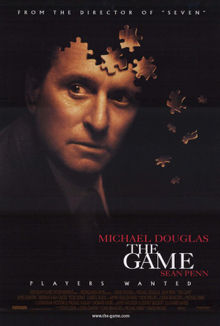Davis Fincher’s The Game tells the story of a wealthy investment banker (well played by Michael Douglas), who is given a mysterious birthday gift by his brother, participation in a game that integrates in strange ways with his everyday life. As the lines between the banker’s real life and the game become more uncertain, hints of a larger conspiracy begin to unfold.
Grade: B (*** out of *****)
| The Game | |
|---|---|

Theatrical release poster
|
|
Narrative Structure:
In the first scene, Nicholas Van Orton, a wealthy investment banker in San Francisco, has lunch with his estranged younger brother Conrad (Sean Penn) who gifts him an unusual present for his 48th birthday—a voucher for a “game” offered by a company called Consumer Recreation Services (CRS).
Though skeptical, he goes to the CRS office to apply, but the time-consuming psychological and physical examinations irritate him, and he is later informed that his application has been rejected.
Last Sequence (Spoiler Alert):
Attacked by CRS guards, Nicholas takes Christine to the roof. Realizing Nicholas’s gun is not a prop, she frantically tells him it is only a game; his finances are intact, his family and friends are waiting on the other side of the door. He refuses to believe her, and shoots the first person—Conrad, bearing a bottle of champagne.
Devastated, Nicholas then leaps off the roof, but lands on a giant air cushion. He is greeted by Conrad (who is alive since the gun was a prop, and Christine’s fear of the gun faked) and the rest of the people. It turns out everything had been staged by Conrad, in order to turn Nicholas into a better person!
Preposterous Ending:
After a birthday party with friends, Christine (whose real name is Claire) declines Nicholas’ offer for a date; she has another job in Australia. She instead agrees to have coffee with him at the airport.
The Game was originally a spec screenplay written by John Brancato and Michael Ferris in 1991.[10] It was sold to MGM, but the project was put in turnaround and picked up by Propaganda Films.
Producer Steve Golin bought the script from MGM for Fincher to direct. Fincher liked the plot twists but brought in Andrew Kevin Walker, who had worked on Seven, to make the character of Nicholas more cynical.
More revisions were made, like deleting a scene where Nicholas kills Christine before committing suicide. Larry Gross was brought in to make revisions, but, alas, no one could come up with a satisfying or compelling ending to what essentially began as a paranoia noir tale.
The “ambiguous” (non)ending divided many critics, and even the actors themselves.
Fincher has noted several influences on The Game: Douglas’ character was a “fashionable, good-looking Scrooge, lured into a Mission: Impossible situation with a steroid shot in the thigh from The Sting.”
Said Fincher: “movies usually make a pact with the audience that says: we’re going to play it straight. What we show you is going to add up. But we don’t do that. In that respect, it’s about movies and how movies dole out information.” For Fincher, the film was about “loss of control. The purpose of The Game is to take your greatest fear, put it this close to your face and say ‘There, you’re still alive. It’s all right.'”
In retrospect, Michael Douglas said: “It’s one of the very few movies that you could not guess the ending. That’s why I’m such a big sports fan, with sports you can never guess what’s gonna happen. Most movies you get halfway through, and you can kind of guess the ending.”
The Game you could never figure out what the ending was gonna be. Fincher is a very talented filmmaker. It was an extremely tough shoot, it was very long, a lot of nights. I thought it was a really well-made picture, very unpredictable and I do hear that people liked a lot.
David Fincher later admitted that he was not proud of the movie.
Explaining his working relationship with his wife, longtime producer Ceán Chaffin, the filmmaker said he discusses his projects with her and that they’ll often disagree: She was extremely vociferous, for instance, when she said, “Don’t make The Game” and in hindsight, my wife was right. We didn’t figure out the third act, and it was my fault, because I thought if you could just keep your foot on the throttle, it would be liberating and funny.
In the Criterion edition, Fincher acknowledged incorporating elements of the writings of Kafka: Echoes of Franz Kafka are hard to miss in Nicholas’s plight—like Josef K. in The Trial, he’s caught in a series of senseless ordeals controlled by faceless people he can’t begin to understand—and viewers may also think of Thomas Pynchon when it starts to appear that the conspiracy against Nicholas includes everyone in the story except him.
Fincher himself has described The Game as a postmodern version of A Christmas Carol, with Nicholas as a Scrooge-like emotional miser who regains his soul after passing through a whirlwind of life-changing encounters.
Credits:
Directed by David Fincher
Written by John Brancato Michael Ferris
Produced by Steve Golin, Ceán Chaffin
Cinematography Harris Savides
Edited by James Haygood
Music by Howard Shore
Production company: Propaganda Films
Distributed by PolyGram Films
Release date: September 12, 1997
Running time: 128 minutes
Budget $70 million
Box office $109.4 million










